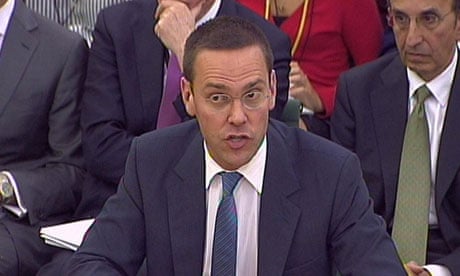There's an irony at the heart of the News International crisis and it's do with language. I can't think of how many meetings I've sat through where people have explained that language has become less important because we now live in a visual age. While it's true that the present proceedings take place in front of cameras, the whole matter, right from the event of phone-hacking itself, through to the resignation speeches, Commons hearings, debates in the house, this newspaper's forensic investigations and the world media's analyses, is language-intensive.
So have there been any moments of linguistic interest in all this? The big players in the government, police and News International have a two-faced interest: a) that they are completely open people with nothing to hide but b) they are desperate to avoid incriminating themselves.
We saw this with James Murdoch's evidence in front of the House of Commons select committee over some questioning about "the document" produced by News International's lawyers, Harbottle and Lewis. This allegedly was based on hundreds of internal emails from the News of the World and it is now clear that it's a highly incriminating cache of information. Murdoch Jr told us: "I am glad you have asked about it, actually, because it is a key bit of outside legal advice from senior counsel that was provided to the company, and the company rested on it. I think it goes some distance in explaining why it has taken a long time for new information to come out."
Probably the most significant word here is the word "actually", which many of us (especially children) use to lend weight to something we are saying which we fear will sound suspect. We now know that a peculiar ballet has gone on around this document with the Murdochs claiming that the lawyers in effect misled them about its significance and the lawyers claiming that they are restricted by confidentiality agreements with the Murdochs themselves. The "actually" betrays a fault line and the one thing Murdoch isn't is "glad".
A few days later, David Cameron was under pressure, answering questions (11 in all) concerning the kinds of conversations he had had with his friend Rebekah Brooks about BSkyB. He stated: "There was not one single inappropriate conversation…" The words "appropriate/inappropriate" have been a great standby in this set of events and will, I'm sure, do good service in the future. They probably derive from the world of counselling and therapy but are ideal for politicians when they want to sound precise while being the opposite.
My favourite evasion on this matter though was Cameron's reply: "The point I'm trying to make is this: I had no responsibility for the BSkyB takeover." Of course, this wasn't an answer but it also rests on us believing that there is a firewall between Cameron and the culture secretary, Jeremy Hunt, so that no matter what Cameron and Brooks said to each other would have no bearing on Hunt's decision-making. The feebleness of this argument is revealed by the petulant rhetoric of "The point I'm trying to make is this…" the like of which Cameron often relies on to imply that his questioners are too dim to "get it". How interesting, though, that the prime minister didn't see fit to simply tell us all what he and Brooks really did say.
Like Margaret Thatcher with her famous use of the dialect word "frit", Cameron likes to do the common man bit. His favourite resource is the mass media as with the Michael Winner "calm down" quote. In this debate it was the use of the Sun's offensive headline "Gotcha", though in this context, you might have expected him to have avoided anything that might imply an overly familiar relationship with any News International product.
Meanwhile, one of the minor characters in this drama, Boris Johnson, brought another phrase to the table when he wanted to deny that there was any analogy between the Met's Stephenson appointing Neil Wallis and Cameron appointing Andy Coulson: "I don't think there's a very clear read-across," deriving from politicians hobnobbing with company directors who've just been reviewing the year's accounts. As it happens, it got Johnson into trouble. He doesn't like being in a tight corner and told the journalists who were trying to get him to say something indiscreet: "I'm not here to discuss government appointments." As this whole matter seems to be turning on appointments of one kind or another, I suspect we've got a lot more talk like this to listen to about who isn't here or there to discuss this or that.

